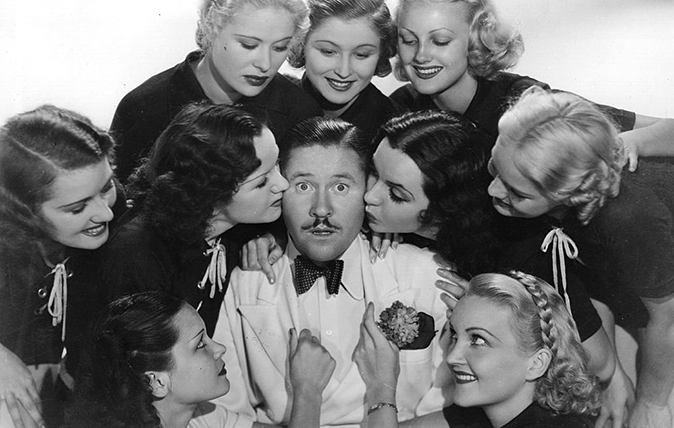To kiss, or not to kiss? The question on everybody's lips
Deciding the correct way to greet someone has become a social minefield.


Exquisite houses, the beauty of Nature, and how to get the most from your life, straight to your inbox.
You are now subscribed
Your newsletter sign-up was successful
A kiss on the hand may be quite Continental, but what of a kiss on a cheek? Or even – mon dieu – multiple kisses? What started as the preserve of the French, artistic types and the lovies among us has swept our nation and left us all in a state of confusion and social awkwardness. Just how are we supposed to greet one another these days?
‘A kiss may ruin a human life,’ said Oscar Wilde. A tad dramatic for our purposes, perhaps, but a miss-kiss can definitely cause a shaky start to a meeting. The crux of the issue is, certainly, uncertainty.
First and foremost on this list of uncertainties is the basic dilemma of whether or not we should kiss the individual before us at all – wouldn’t a handshake be more correct? Debrett’s attempts to shed some light on the situation thus: ‘As a general rule, don’t kiss people you don’t know. Don’t kiss colleagues. Do kiss close friends and dates. The key is to make your actions clear to avoid embarrassing confusion.’

However, it goes on to muddy the waters by explaining that this ‘general rule’ is dependent upon multiple variables: ‘situation, age, background, profession and your relationship’. Thus, whereas it’s probably not the done thing to dive for the cheek of your boss or bank manager, you might well wish to bestow a peck on a schoolfriend or your interior decorator – as previously mentioned, artistic types are, as a general rule, more likely to indulge in the bise.
This decision, however, is merely the first hurdle. Once committed to a kiss, which cheek should one aim for? The generally accepted wisdom is that you should aim for the right cheek, therefore you head left, but it would appear that not everyone got this memo and you should always be prepared to ‘change direction at the last minute’.
More often than not, this lack of co-ordination will result in, at best, a clashing of noses or, at worst – depending on your feelings for the recipient – a clashing of lips. Should the worst happen, there is really little to be done other than to laugh awkwardly and move onto the next item of business.
'We just aren’t terribly comfortable with demonstrating affection. I still remember my father finding me prostrate and sobbing on my bed as a heartbroken teen. ‘There there,’ he said, patting me awkwardly on the back. ‘Would you like some gin?’'
If you manage to navigate your choice of cheek successfully, bravo – but you’re not home safely quite yet. Next on the list of uncertainties is whether one kiss suffices – or should we go in for a second? (The British, quite frankly, shouldn’t even consider a third or fourth – we just can’t pull it off.) Generally speaking, if you’ve kissed them once, you’ll probably be expected to do so twice – in for a penny, in for a pound.
Exquisite houses, the beauty of Nature, and how to get the most from your life, straight to your inbox.
Conversely, a single kiss can actually be taken as a signifier of a deeper relationship – something to consider if you don’t wish to start the rumour mill turning.
These main hurdles being safely cleared – or embarrassingly blundered through – there are other, lesser factors that nonetheless warrant consideration. Should your lips make contact with their cheek? (Yes – air kisses are false – but only lightly as saliva is unpleasant.) Should you make a sound? (No, mwahs are deeply distasteful – unless you’re actively mocking people that faire la bise and the recipient is in on the mockery.)
| Country Life’s guide to modern greetingsStranger: HandshakeColleague: Handshake or two kisses, depending on relationshipFriend: One or two kisses, depending on degree of closenessFamily: One kissLover: One kiss |
Ultimately, the whole issue boils down to one of sincerity – or lack thereof. Having grown up in a distinctly British and suitably non-tactile family, then spent a year living en France, I feel comfortable in asserting that the reason our Gallic cousins pull off the embrace with so much more panache than we ever could is that when they kiss someone, they mean it – we just aren’t terribly comfortable with demonstrating affection. I still remember my father finding me prostrate and sobbing on my bed as a heartbroken teen. ‘There there,’ he said, patting me awkwardly on the back. ‘Would you like some gin?’
But in France, Italy, Spain or anywhere European that isn’t England, a group of young men will enthusiastically embrace one another with genuine warmth and not a hint of discomfort. When we attempt it, we lack conviction – and it’s palpable.
We’re often keen to adopt exotic-seeming foreign customs at the expense of our own, but will we allow the great British handshake to die, in order to carry out rituals that go against our very nature? I, slightly aloof-seeming Briton that I am, will always be an advocate of the handshake. Proffer your hand, grasp theirs and mean it, shaking with all the enthusiasm that your great British reserve can muster – so much more pleasant than a tentative and half-hearted embrace.
Debrett’s offers a final word of warning: ‘If you’d prefer to shake hands, be sure to hold yours out before any kissing manoeuvres begin but, if you’re part of a group introduction, don’t be the only non-kisser at the party.’
And thus, the waters are muddied once again.
Victoria Marston
